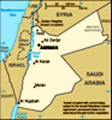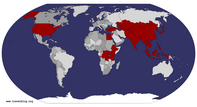Advertisement
Published: November 28th 2005
When taking the ferry from Sinai to Jordan, you have two choices: slow and slower. The difference is $10 and about 6 hours. We boarded the slower boat and for the next 8 hours bumped elbows with the hundreds of young Egyptian men crossing the border in search of work. In our boredom we got to talking with an older Jordanian car salesman who assured us that we as Americans would be "very welcome" in Jordan, that the people were all friendly and peaceful--but in the next breath he dismissed Egyptians as universally "bad people" and Shi'ite Muslims as "dirty." Tolerance, one supposes, only goes so far. In the end he saved us from getting ripped off on the taxi fare to the hotel and treated us to falafel and hummus at a cafe so delicious we returned for breakfast, lunch, and dinner.
Aqaba (the port town where the ferry drops you off) felt like taking a step back towards the First World. From the post office to the bank to the shockingly tame drivers (what are they, sober?), Jordan just seemed more organized and developed than where we'd come from. Granted there are only 5 million people in the
whole country--as opposed to the 20 million in Cairo--so perhaps order is actually a possibility.
After a day in Aqaba we were itching to hit the road. Inspired by a lone Lithuanian traveler we met briefly who had hitchhiked over 3,000 miles, we packed our bags with water and nuts and started walking north on the main road out of town. Our goal was to get to Petra...eventually. We figured we'd catch a ride when we could and camp in the desert along the way if we needed.
A couple of miles past the edge of town, a toothless Bedouin man pulled over to give us a lift. His English was minimal but he understood three important things: "no money," "Jordan beautiful," and "Bush bad." He took us half an hour to his turnoff where he dropped us off, leaving us giddy with our first successful hitching experience. The next two lifts were shorter--a short, free jaunt in a taxi and a very bouncy 10 minutes in the back of a pickup truck we might fall apart with every jolt. In between the rides we made like camels and plodded along the dusty highway with our packs in
tow, admiring the desert landscape. We waved to curious children in small road-side villages and shielded our eyes from passing dust devils.
Our fourth ride came from a policeman-turned-sheep-farmer who was headed home, a small town just 15 kilometers from Petra. Not only did he take us all the way for free, but he invited us in to share tea and popcorn with his family (wife, mother, sister, and four children--small for Jordanian standards, as we learned later). We graciously accepted and consequently got our first real taste of Jordanian hospitality, at the price of being mildly interrogated. After showing off photos of all of their children and pushing their baby into our arms to coo over (in Jordan, babies are EVERYWHERE), they wanted to know all about us. Jordanians invariably displayed disappointment when we explained we didn't have any children. Bear in mind this is always the second question they ask after "are you married?" (which of course we aren't, but here it's inconceivable for us not to be). Eventually they tired of our helpless, floundering attempts in Arabic and let us depart; two more rides later and we were in Petra.
At the entrance to Petra

 Meet the Family!
Meet the Family!
The extremely generous family we stayed with on the bank of the southern Dead Seathe following day, our fraudulent student cards once again saved our budget by halving the entry fee. Once inside, we enjoyed the ancient city quietly at our own pace, alongside a mere trickle of tourists. The site is so enormous and spread out that it's hard to imagine it feeling crowded--though in its heyday, Petra was home to 30,000 people, or so said the tour guide that we eavesdropped on. The city, "lost" for 700 years to all but the Bedouin who kept its location a secret, is carved completely out of the red rock mountains that give it its trademark pinkish color. Its most famous facade (Khazneh, the Treasury and Royal Tomb) was featured in "Indiana Jones and the Last Crusade" as the location of the Holy Grail, a bit of trivia they don't let you forget with gift shops named after the film flanking the entrance. Still, nothing can distract from the magnificence of Petra's logic-defying buildings etched high and deep into the mountains. You really need two or three days to explore the whole city, but we were exhausted after one and decided to head farther up north to Wadi Dana.
A few lifts and a

 The Dead Sea
The Dead Sea
The real reason you float is that it's only a foot deep.short bus ride later, we made it to the tiny cliff-side village of Dana, which offered a spectacular view of the valley below. We camped on the roof of a mud and brick hotel and spent the evening huddled around a fire with other travelers while our Bedouin hosts played bongo drums and taught us a few folk dance steps.
The next day we made our destination the Dead Sea. We caught a bus in that general direction since it was cheap and convenient, and found ourselves getting invited for tea by a woman who lived at the very southern tip of the salty waters. True to Jordanian hospitality, tea was accompanied by a huge dish of mensef (a local specialty) and inquiries about our marital status and number of children from each member of the household--10 in all (Mr. Obaidullah, Samihah, Tasneem, Bara'ah, Abrar, Manelle, Sufyan, Musab, Anas, and Muhammed). Over the course of the evening we were separated into the male and female kingdoms, in which Randy struggled to keep up with guy talk in Arabic and Jenny learned what Jordanian women *really* look like under those face veils. The village was so small that we could

 Amman, Jordan's Capital
Amman, Jordan's Capital
Don't let the blue sky fool you, it rained almost our entire stay in Amman.stand on the roof and see the local mosque on one side and both the boys' and girls' schools on the other. The Dead Sea was a tantalizing blue sliver on the other side of the road and the lights of Palestine glittered in the distance.
Aunts, uncles, cousins, and curious neighbors were constantly dropping by to say hello. It seemed our arrival was a real occasion: they brought out pictures of the last Western couple they'd befriended, which was a French pair from 10 years earlier. They insisted we spend the night on mattresses in the living room and we stayed up wondering how we could repay their kindness. The next morning, when Jenny was showered with scarves and jewelry as gifts, we were even more humbled at their generosity.
The feminist in Jenny, though, reared its ugly head when she was informed by the mother that, unless she stayed covered head to toe, she wouldn't be allowed to swim in the Dead Sea with Randy and two of the sons. By the time we actually made it to the shores and the sons explained that they were more liberal than their mother and it would be
fine if Jenny swam, the damage was done: Jenny hadn't brought her suit anyway and was doomed to wallow in the shallow water while Randy happily floated--hands free!--100 meters out.
So what was the Dead Sea actually like? With every step we sank knee deep in some clay/mud mixture (that, incidentally, fetches a high price with women who like to smear their faces with the stuff). Lurking beneath the clay are sharp salt crystals that slice you're feet if you're not careful, giving a whole new meaning to "pouring salt on a wound." Once beyond the banks you're free to experience the wonders of effortless maritime buoyancy (Jenny wouldn't know). This was definitely not a tourist beach; other than the two sons and a couple of sheep herders inland, we were alone. After Randy got his fill of floating, we relaxed with a cup of tea on the shore and headed back to the house for yet another delicious meal and more chitchat.
We finally said our goodbyes--promising to write and send pictures in the mail--and hitched a ride from a truck headed north. The driver was young and spoke good English, which he primarily used to hound
Jenny to find him an American girlfriend (it was only later that we discovered he already had a fiancee). Like many trucks on the Jordan freeways, this one often crossed the Iraqi border to transport supplies for reconstruction. Our driver took us to a local hot springs where we walked a half mile inland to get our own private pool and waterfall. Randy was relieved to wash off the Dead Sea salt; Jenny was just happy she was allowed to swim.
Once again we were invited to stay the night with this driver's family in Madaba--and who are we to refuse? In this household, we experienced much the same as in the last--a lot of silence between broken phrases of English and incomprehensible Arabic, combined with laughter and shoulder-patting. At one point the uncle offered to trade Jenny for his wife, which was funny the first time, but when he said it again Jenny didn't laugh so much. Thus ended our first $0 day on the trip so far!
The next morning we gratefully accepted a ride to Amman, the capital of Jordan where the bombs went off two weeks prior to our arrival (we weren't planning to
stay at the Hilton anyway). From the locals we talked to and the English paper, "The Jordan Times," it was clear that Jordanians condemned the bombings and the philosophy behind them. There were protests and even art shows to demonstrate the outrage Jordanians felt. This was the first terrorist attack in Jordan--an amazing feat considering its neighbors (Israel, Syria, Iraq, and Saudia Arabia).
Before being dropped off at our hostel, we were brought to the office of a colleague of the family we'd stayed with. We weren't sure what to expect, and having lacked a real shower for three days were certainly caught off-guard when we came face to face with a professionally dressed Iraqi man with impeccable English who was the president of a contracting company involved in reconstruction work in Iraq. He spoke casually of family members and coworkers getting kidnapped and held hostage by insurgents just because of the work he was doing. He in fact had relocated to Jordan for safety. We felt grossly unprepared but were fascinated to hear about his work and first-hand accounts of an Iraqi's perspective on the war.
Besides this interesting--if brief--encounter, Amman was uneventful. With cold, rain, and
gloom outside the door, we hesitated to explore much. Instead we warmed our hands over our tiny stove and Randy recuperated from a head cold. We contemplated a short trip to Jerusalem but didn't want to risk getting the Israeli "Stamp of Death" in our passports (kiss those Sudanese visas goodbye!). So back down to Aqaba and another highly overpriced ferry to Egypt. Next stop Cairo to beg for our onward visas and get back on track to Africa.
Advertisement
Tot: 0.184s; Tpl: 0.016s; cc: 19; qc: 93; dbt: 0.0808s; 1; m:domysql w:travelblog (10.17.0.13); sld: 1;
; mem: 1.3mb






















Nikki
non-member comment
You're so brave
I can't believe you guys hitchhiked in Jordan! I always love seeing your pictures. It definitely seems like a once in a lifetime experience. You have definitely inspired Chris and I to do something similar. Love you! Nik